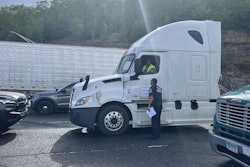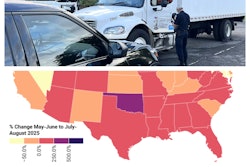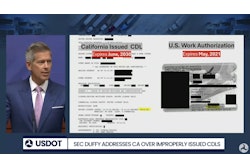In the aftermath of DOT's emergency rulemaking looking to remove almost 200,000 non-domiciled CDL drivers from truck and bus industries, a law firm has issued a legal alert warning of grave financial risks.
DOT's new rule, titled "Restoring Integrity to the Issuance of Non-Domiciled Commercial Drivers Licenses," called out instances of state licensing agencies granting non-domiciled CDLs to those in the country illegally, sometimes for terms years after their legal length of stay in the country expired.
In a series of fiery press conferences and releases, DOT Secretary Sean Duffy has called attention to "egregious" and "catastrophic" safety lapses in regs enforcement and licensing.
Now, Gregory Reed, a partner at Hanson Bridgett, a law firm with experience representing trucking and transportation clients, warns the rule will "have an near-immediate, significant impact on the trucking and logistics industry."
That impact isn't limited to just the nearly 200,000 non-domiciled CDL holders (or five percent of all current interstate CDL holders, Reed estimated) but the entire regulatory footing of CDL credentialing. The regulation "casts doubt on the legitimacy of the entire licensing system, increasing risk to those companies that work with such drivers," Reed wrote on the firm's website.

DOT's rule limits non-domiciled CDL issuance to foreign visitors who hold specific types of visas, increases the documentation required, requires in-person annual renewals, and requires more state-federal collaboration on non-citizen driver licensing. DOT's goal, it said, is to get 194,000 non-domiciled CDL holders, out of 200,000 total, out of industry over time. Already, DOT has notified states of some CDLs that need out-and-out revoking.
According to Reed, "By casting doubt on the legitimacy of all current non-domiciled CDLs, the emergency regulation has exposed trucking and logistics companies to an increased risk of liability."
He urged trucking companies to act: "If an accident were to occur, plaintiffs' attorneys would likely argue that logistics and trucking companies are now on notice that non-domiciled CDL holders may be operating unlawfully and are insufficiently qualified."
Asked if this would sweeten the pot and bring out more lawyers looking for the "nuclear verdict" against trucking companies, Reed said "absolutely."
Plaintiff's attorneys, thinking about the victims in the Hope Trans or White Hawk Carriers crashes, might cite DOT's statements that question "not just whether these drivers' CDLs were illegitimately issued, but whether or not they were properly trained."
[Related: Six states issuing CDLs 'not consistent with federal regulations': What's going on]
Those lawyers will use this now-public argument of safety lapses "to support larger verdicts in pursuit of the nuclear verdict outcomes," said Reed.
Reed advised Hanson Bridgett clients, a group that "represents every aspect of our modern day transport network" (small and large motor carriers, brokers, shippers), and many who "maybe relied significantly on non-domiciled CDL holders in order to flex capacity" to act immediately.
Here's Reed's advice:
- Audit all existing employee or contract drivers to determine whether any are holding non-domiciled CDLs. Brokers should engage with frequently used carriers to determine the scope of their exposure to non-domiciled CDLs.
- If employee or contract drivers are identified as non-domiciled CDL holders, work with legal counsel to determine how to assess whether these individuals have the sufficient records to demonstrate that their CDLs will not be revoked based on ongoing and forthcoming audits.
- Begin a process to limit use of these drivers until they have their non-domiciled CDLs confirmed or renewed.
- Incorporate new or reinforce existing contractual language making clear that drivers must be properly licensed, have a lawful employment status, and qualified to operate a commercial motor vehicle.
Perhaps the only group that Hanson Bridgett doesn't really represent, and one of the only groups in trucking this legal alert doesn't apply to, is owner-operators, whether with motor carrier authority or leased.
Owner-ops know very well who's driving their trucks. In fact, the voices of trucking's owner-operators might have worked to uncover the rise of non-domiciled CDL licensing long before DOT ever spoke out. For more than a year now, owner-operators have been asking about an influx of foreign drivers seen around the country. After extensive research, surveying and more, Overdrive released its own audit of states' non-domiciled CDLs issuance, documenting the rise in numbers in recent years.
Yet it's important to note that Reed's advice to fleet owners and others isn't something as simple as fire and cut ties with all the non-domiciled CDL holders right now.
"There are labor and employment rights matters when it comes to understanding who you work with, particularly as an employer and employee," said Reed. "That’s why I mention that people should work with labor employment legal council if they're going to audit the driver employees."
It is illegal to discriminate on the basis of country of origin. In fact, in 2023, Covenant Transport had to pay the Department of Justice $700,000 after DOJ found Covenant "routinely discriminating against non-U.S. citizen workers when checking their permission to work in the United States."
But tides have turned. Now the Trump administration itself seeks to push these drivers out of trucking, and no trade association, union or workers organization has raised a finger against it in court.
Now that big players in the industry have taken notice, Reed said the entire business is lucky to have dedicated owner-ops who care about trucking.
[Related: Washington admits mistake in issuing Harjinder Singh and 685 other non-citizens full-term CDLs]
"There's a big spot in my heart for owner-operators, but they aren’t my regular clients," said Reed, who has worked extensively with the Owner-Operator Independent Drivers Association in the fight over the California AB 5 independent contractor law. Owner-ops obviously seek to stay out of most legal messes, and "are incredible consumers of information. Because owner-operators have to live and breathe the industry, they will always be a significant component that's critical to our national transportation network and the backbone of it today."
He added, "If we’re putting them in a position where it’s harder to be successful in their careers or a component is more dangerous, then we are really undermining our own interests."
If hardworking and skilled Americans can't make trucking work, then the industry and perhaps the entire country has failed them.
One reason resistance to the new rule on non-domiciled CDLs hasn't materialized, despite a longstanding "driver shortage" narrative, is that rates have been in the dumps for as long as they have. "The industry has suffered the great weight of a prolonged recession," he said, and in the constant search for the event or turning point that was going to allow the industry to rebalance," the notion that some shock would cause either capacity to tighten or freight to increase, the Trump administration appears to have provided it with two major moves.
Namely, what Reed called the "bold" regulatory actions on English language proficiency and non-domiciled CDLs.
For now, rates appear to have lifted just slightly.
[Related: 'Foreign driver capacity' hit incoming? Fleets watch, as owner-op income back on a slow rise]










